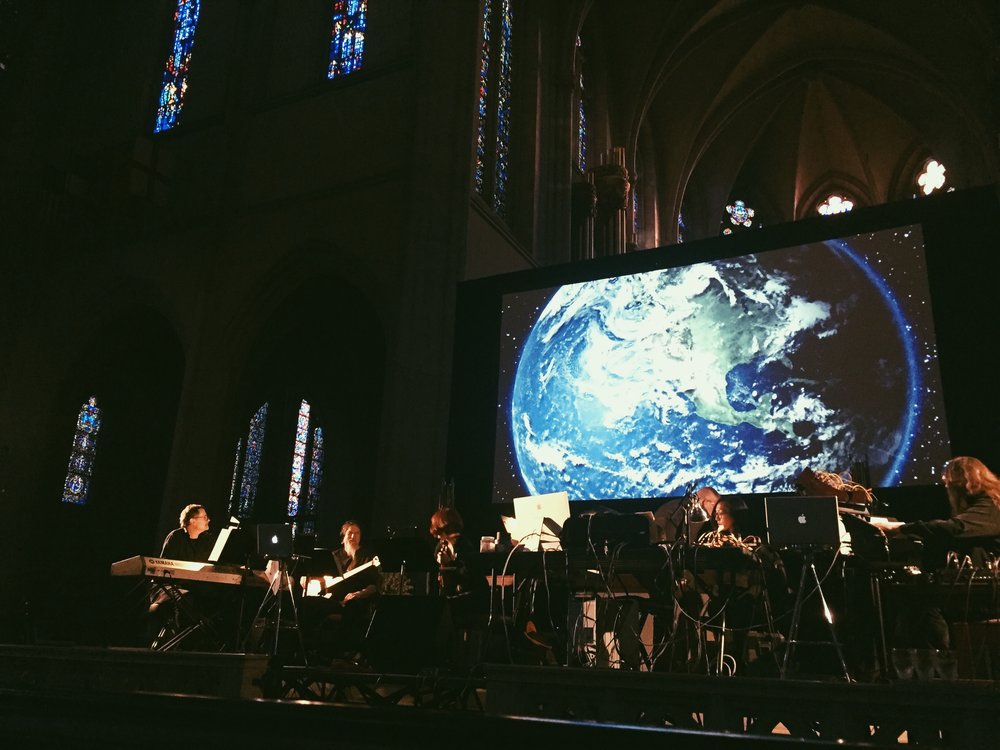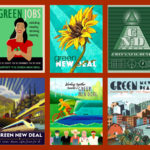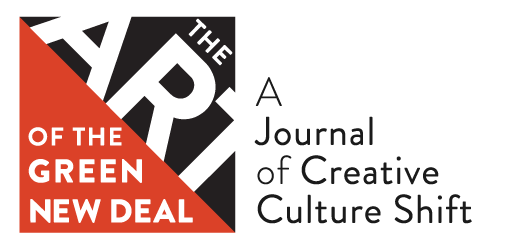
The Climate Music Project: Translating the abstract into the personal
While we’re undoubtedly in a moment of unprecedented challenges when it comes to the scientific realities of climate change, there are some who think we have all the tools we need to solve them. Or shall we say, all the instruments?
Stephan Crawford conceived of the ClimateMusic Project (CMP) one night in 2013 while thinking of a way of expressing Earth’s carbon cycle through a moving sculpture, tapping a metal rod against his workbench. As the San Francisco artist explains the project’s genesis, “that tapping made me think of a rhythm, and then it went straight to the idea of music.”
Since that original epiphany, the impromptu jam of an idea has turned into orchestras of sound and meaning, quite literally. Harnessing the universal language of music, Crawford and his collaborators have been able to relay the urgent story of climate change to an ever broadening audience without the usual yawn-inducing response to scientific data.
CMP’s original two in-house portfolio compositions are multifaceted opuses that trace the history as well as potential trajectories of climate change though musical renderings of scientific data sets. Combining the talents and expertise of world class scientists, composers, musicians, artists, and technology visionaries, ClimateMusic enables the creation and staging of science-guided music and visual experiences to inspire people to engage actively on the issue of climate change.
“Climate“, composed by Erik Ian Walker, tracks historical and projected variations in the climate system from 1800-2250, using indicators such as carbon dioxide concentration, near earth atmospheric temperature, earth energy balance, and ocean pH. Icarus in Flight, an original chamber work composed by Richard Festinger and first performed by the Telegraph Quartet, models three human drivers of climate change – population growth, fossil fuel use, and land-use change – from 1880-2080.
The non-profit, non-partisan ClimateMusic Project is currently expanding its focus and range to enable artists wherever they are and through their own music to communicate the urgency of climate change to audiences that may not be intimately familiar with the timelines of the issue.
TAO the GND publisher Sven Eberlein recently caught up with Stephan Crawford at his studio where he shared his personal thoughts about science, music, climate change, and of course, the Green New Deal.
What we’ve found in more than five years of performances is that music has a visceral impact on people that helps to translate the abstract into the personal.
The Art of the Green New Deal: How can the ClimateMusic Project reverse the paralysis and overwhelm many people are feeling in the face of the magnitude of the climate crisis?
Stephan Crawford: We’re just one small piece of the puzzle. There are a lot of great groups out there doing great things. But I think that generally music and our project takes a hearts and mind approach, to help people see what’s not obvious, or what seems too abstract. The climate crisis is a difficult crisis, because even though we have all the information — we’ve known everything we needed to know about climate change for 40 years (see “Yes, humans are causing climate change. And we’ve known for 40 years“, the editor) — after you read a study or watch the news about it you go outside and the sun is shining and you can’t really connect that study with your own perception of the world today. And so I think for many people it remains a very abstract issue.
Now music is a language, and a language of many dialects, and it’s universally accessible for the vast majority of people. It’s a visceral language that tends to stick with people. You think about songs that have stuck in your head or how you react when you hear your favorite song — it’s very powerful. So the ClimateMusic Project believes that we should harness this powerful tool to find ways to express insights about the situation we’re in, and about the science in particular, via the medium of music.
What we’ve found in more than five years of performances is that music has a visceral impact on people that helps to translate the abstract into the personal.
So how does it speak to people personally?
Let me give you an example of how it works. We always do an audience engagement segment after our performances. After the very first one we had at the Oakland Planetarium in 2015, a woman stood up and recounted how she was just sitting there, listening to the music envelop her, watching the visual time ticker, and thinking to herself, “this is what the music sounded like when I was born, this is what the music sounded like when my daughter was born, and then this is what it could sound like when my granddaughter gets born.” She said the experience took something that used to be very abstract to her and for the first time dropped it right in the arc of her family’s own history. It really was an eye opener for her, a key insight.
You know, music is a complex system, just like the climate. And in this context, music is a little bit like a time machine, because we’re able to model things to let music flow across time. So we can take people into the past to experience what we know the climate was like, then shoot them into the future to explore various possible scenarios, and then come back to the present, all in 30, 20, or even 10 minutes. This ability to go on a journey with music and then come back to the present is what we find is very effective.

It’s like putting yourself in the shoes of a glacier…
Yes. The problem is a little bit like the one Galileo found when he was trying to convince the pope that the earth was not at the center of the universe. If you were an average person alive at that time, you could buy the argument that the earth was at the center of the universe just based on your observations.
You know, to think that it could be otherwise really required a mind shift, and in a way climate change is a similarly confounding problem, because what we experience personally and in the short term is weather, not climate. So we say, “okay, what do I care if it’s two degrees warmer? I actually like it. I’d rather have it be 78 than 76 degrees.” I think there’s a real problem in the way climate science has been communicated to the public, because unfortunately much of the public doesn’t have the context within which to draw the connections in order to understand what climate science is actually telling us.
So we’ve been exploring ways in which to identify these conceptual sticking points and highlight them. For example, think of the human body for the idea that it doesn’t take much of a change in a variable within a complex system to fundamentally change that system. If you raise your body’s temperature by 1 percent, you go from a human who is feeling great to a human who is feeling, say, a bit off. You raise it 2 percent, well, that person is no longer feeling well. You raise it 4 percent, you have a very sick human. You raise it 6 percent, you have an almost dead human. So again, the idea that is sometimes hard to comprehend is that it doesn’t take huge changes to fundamentally alter very complex systems.
How do you get the people who need to experience that message to come to a performance?
Well, two things about that. One, so far we’ve been working in the Bay Area. Our first two years were really more proof of concept, so we were mostly in science museums and planetariums where the audiences are pretty self selected. But even in those situations we found that although most people are aware of climate change, a surprising number of people even in the Bay Area are not aware of the urgency of the issue. And that’s really what we’re trying to communicate, the urgency of the issue.
But secondly, our strategy is fundamentally shifting now. We’re beginning to pivot away from creating our own music and concerts by enabling artists wherever they are to work with us to create their own versions of climate music to integrate them into their own concerts and performances in their own communities. This way we get around the problem of having to invite people to come to a climate concert.
You know, on a Friday night most people, especially the ones who aren’t thinking about this issue, are going to want to have fun, not go to a climate concert. However, if their favorite band or musician that they’re going to see anyway says in the middle of the show, “hey, this issue is really important to me and here’s a song I wrote about it,” then they’ll get the message in an unexpected way.
So we’re looking to identify creative voices in communities wherever they are, and working with people who already have fan bases to help them take this science-guided message to those populations.
So what’s the process of decentralizing your creative messengers while still keeping a coherent message?
We’re buttressing our ability to work with multiple artists. What we’re doing is art guided by science, and in order to keep the scientific insights informing the artistic process, we really have to have a methodology. There’s a lot of work involved, from identifying the data sets and preparing them in ways the artist can use to a long interactive composition process during which the artist(s) and scientist(s) work hand in glove to explore how to actually integrate those scientific insights directly into the music.
So in order for this new strategy of reaching out to artists wherever they are to work, we really have to have this down well, and we’re just now finalizing the first iteration of it. So we’ll become more of a platform providing resources that help artists create their work.
Realistically, for the Green New Deal to succeed there has to be a big groundswell of support. We need to start thinking in terms of society and not just individuals seeking to maximize utility.
What do you think it’s going to take for us as a society not only to pass but actually live any kind of Green New Deal reforms?
The powerful thing about the Green New Deal is that it has the potential to speak to people’s needs and to the systemic injustices that have been going on in this country for far too long. It’s important to come up with a platform that speaks to a broader definition of prosperity.
What we hear too often is that “oh, it’s going to cost too much,” but no one ever addresses what happens if we don’t do it. The costs of inaction are much more severe than anything that would come from taking action. The cost would really be an investment, and investments have a way of paying back over time. We can invest in the future and earn the money back over time.
I think FDR set a great example with the original New Deal. Given his social position he could have floated through easily, but he made hard decisions to actually learn about things. Before he was even running for office he visited every corner of the US to see how people lived. Ultimately, he was not afraid to recognize the severity of the situation and to dream big.

Realistically, for the Green New Deal to succeed there has to be a big groundswell of support. We need to start thinking in terms of society and not just individuals seeking to maximize utility. A society where people recognize that they have freedom and can make individual decisions, but they also recognize that they are connected to everyone else in that society in multiple ways that bring benefits to everyone.
Let’s say a bunch of Green New Deal programs get launched. How do you see climate music and music in general communicate the solutions to the climate crisis?
So when I talked about our project communicating the urgency of the climate crisis, I only got it half right. The music really is an excuse to convene people around the issue, but the other half of what we do is the action side. Actually, we really have three parts — science, music, and action. What we do on the action side is recruit highly respected organizations that help people to learn more about the issues, take action at home, take action on a societal level, and to build community around engagement.
What we’ve found is that after our concerts there’s a lot of emotional energy in the room from the performance, and the last thing we want is for people to just go home and have that energy wasted. We’re increasingly integrating this partnering network directly into these events, so instead of the energy just dissipating we help to channel it appropriately into different organizations.
However, we want to be really broad about it because climate change is a symptom of the dysfunctional ways in which we’ve organized our society and economy. So we want to stress that there are many ways in which people can get involved, whether you’re interested in the food system or women’s issues, or anything else.
Do you think a musician could compose a piece about the food system, something like “The Anatomy of Food”?
To the extent that there’s science and data attached to it, absolutely! And I don’t mean the overused term “data driven.” Science is not just data, and if there’s not a context around the data, it can really be misinterpreted. So it’s really the scientific understanding of interpreting data that we want to inject into the music. So any topic that could hold that would work.
I’m thinking that some of the decades-long studies the Rodale Institute has done on soil health and carbon absorption would be perfect…
Yes. In fact, one of the next projects we’ve been talking about doing in our leadership council is a piece on “what if we adopted the right solutions?” What if were actually were to aggressively take advantage of the technology that we already have and really focused on that 1.5 degree goal? (Editor: see IPCC report) What would that look like, and by extension, what would that sound like? So that’s an example of the solutions oriented pieces we’re going to be doing.
Thank you so much for the interview.





















No Comments